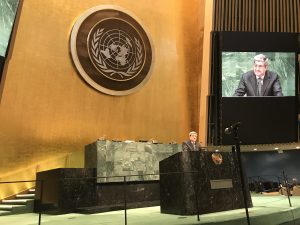NEWS – IHRA Chair De Bernardin: “Remembrance: an Eternal Commitment Too Often Neglected”
 Ambassador Sandro De Bernardin, chair of the International Holocaust Remembrance Alliance, delivered the following speech before the United Nations General Assembly and the Secretary General Antonio Guterres on January 27, 2019, marking the International Holocaust Remembrance Day:
Ambassador Sandro De Bernardin, chair of the International Holocaust Remembrance Alliance, delivered the following speech before the United Nations General Assembly and the Secretary General Antonio Guterres on January 27, 2019, marking the International Holocaust Remembrance Day:
Secretary-General Guterres,
Under-Secretary General Smale,
President Espinosa,
Excellencies,
It is a great honor to address you in my capacity as the Chair of the International Holocaust Remembrance Alliance: an intergovernmental body of 32 member countries that are formally committed to strengthening, advancing and promoting Holocaust education, remembrance and research.
This morning we heard expressions of concern and appeals to act, in order to keep the memory alive and stand against the return of such dark times. The IHRA is the most structured response provided by the International community to these concerns.
Its creation was prompted, some twenty years ago, by the findings of a poll, showing that the horror of Auschwitz, Treblinka, Sobibor were at risk of disappearing from the collective memory of new generations. Since then, the members of the IHRA have worked to reverse this trend.
But is collective memory in better shape today? In particular, are people aware enough that the Holocaust was not an incident of History that came out of the blue, but was the outcome of a process marked by very specific milestones? And that prominent among these milestones was the legal discrimination of sectors of the social body? That the Holocaust was announced by the progressive denial of human rights of individuals and groups?
The IHRA Community are not very tranquil in this respect. And last year they decided to intensify their commitment against the ongoing distortion of the narrative of the Holocaust, as well as the trivialization of some features of the Nazi and Fascist persecutions.
In this context, in 2018 – on the 80th anniversary of the Italian racial laws – the IHRA began a first systematic survey of discriminatory regulations introduced in various European countries during the Thirties. I am sure that, when the study is completed, its findings will be relevant also for present political debate.
In his novel If This Is a Man, based on his personal experience in Birkenau, Primo Levi reported of a recurrent nightmare of deportees: to survive, to go back home, to tell their stories and to not be believed. We have to admit that, still today, that nightmare often comes true.
Indeed, I daresay, the first human right to be protected is the right to memory. Therefore, the defence of human rights should start with the safeguarding of the record and the countering of distortion.
Mister Secretary-General,
I definitely like the exhortation, under the umbrella of which we are convened today: Demand and Defend Your Human Rights. Yes, Demand: because human rights are a public good and, as such, the property of all. A public good is indivisible: so, it cannot be denied to anybody, neither an individual nor a given group. Moreover, we learnt by experience that the hate, that begins towards one group, only seldom ends with that group.
And yes, Defend: because – as Hillel the Elder warned– “If I am not for me, who will be for me? And when I am for myself alone, what am I? And if not now, then when?” (Pirkei Avoth 1, 14).
To demand and to defend cannot be seen as perfunctory tasks. What is at stake is too important to be treated as a matter of ordinary administration. The protection of fundamental values always requires a proactive stand and affirmative action.
To be effective, such action is to be based on the joint commitment of governments and civil society, pooling all political, bureaucratic, scientific, educational and mediatic tools. Interaction between government officials and experts is precisely what characterises the work of the International Holocaust Remembrance Alliance. I think it is a good model.
With this in mind, I expect this meeting to contribute to spreading a simple message: when you hear calls to restrict anyone’s rights, when you hear the sound of the bell of discrimination, “never send to know for whom the bell tolls. It tolls for thee” (John Donne, Devotions upon Emergent Occasions).
Thank you.
